
We left D.C. and headed North, into Amish country, specifically Lancaster
County which has about 1300 Amish farms and 22,000 or so Amish and Mennonite
residents. Old order Amish do not own or drive cars; they dress according
to a fairly rigid code of dress, and plow their fields using teams of horses or
mules. They are very polite, nice, intelligent people who keep to
themselves as part of their church doctrine -- they purposely avoid 'worldly'
pursuits and those that pursue them. What little contact we had we enjoyed
muchly.
This is the view from our campsite's 'front yard'. The town of
Intercourse (once called "Cross Keys") is almost entirely a farm
town. Intercourse apparently once meant "a crossing of
roads". Our campground had farms on 3 sides, including the one in the
background. The predominant scent, from our site, was of eau de cow.
It was overwhelming, initially. We gradually became used to the smell and
didn't notice it after a day or two.
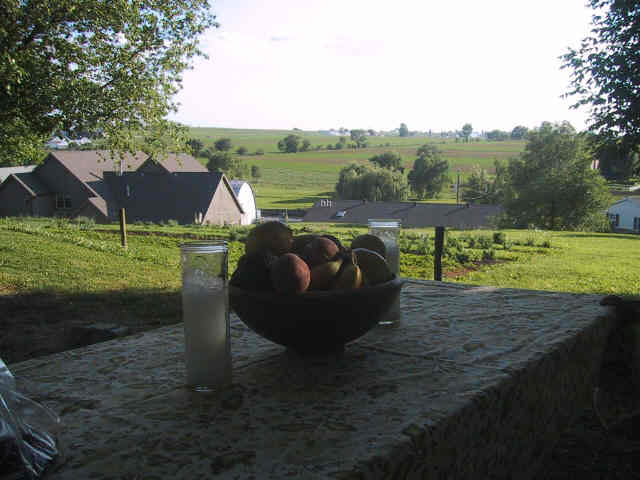
I actually cooked part of dinner for this first night in Amish country --
only the 2nd time I have done so on this entire trip. I do, however, wash
a lot of dishes.
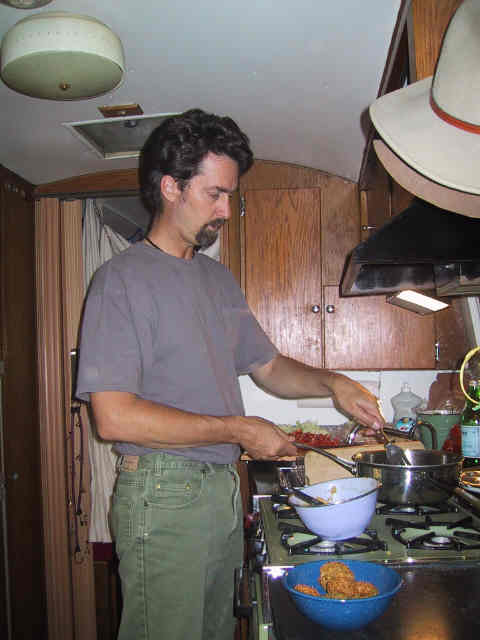
Jordan and Jody enjoy the sunset from our campsite, surrounded by Amish
farms.
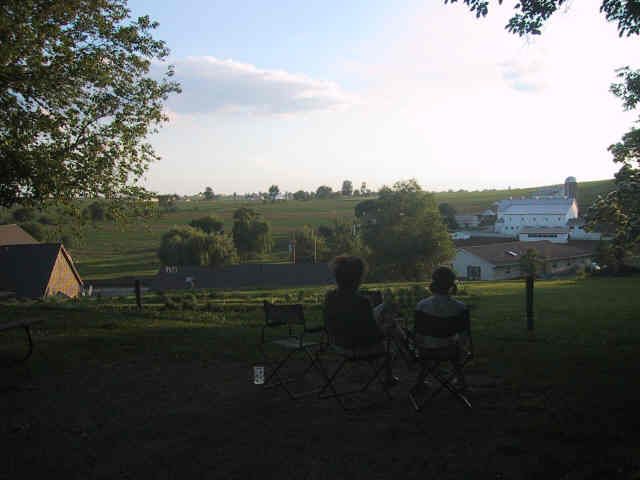
The day after our arrival, we had a lot of questions about who the Amish
were, and why they lived as they did, so we started off with a tour of a
reproduction Amish farmhouse, followed by an odd little film called 'The Amish
Experience' in "F/X Theater". The farmhouse tour was good, and
the tour guide very knowledgeable. This helped a lot; "F/X
Theater" was touted as very unique, one of only 3 such theaters in the
U.S. We now understand why there are only 3 -- the film and effects were
that cheesy. However, it did give us one more important bit of information
about the Amish: Amish teenagers are not baptized at birth. Youth must
choose to join the Amish church, and they typically do so in their late teens --
but there is no time limit. If they choose not to join the church, they
may still have dinner with their parents from time to time, but they may have no
other contact with any other Amish. They become 'English', which is the
name the Amish give to all non-Amish, and are shunned. We discussed this idea, and all of
us liked the idea of adult choice. Apparently about 90% of Amish teens choose to be
baptized into the Amish church.
Part of the farmhouse tour included the items of clothing in the photos
below, all hand made. Boys clothes are on the left, and girls on the
right. The only personal choices that can be made is the color of the
shirts for boys or men, and the color of the dress for girls or women. The
cloth is always cut the same, and all the black you see never changes. The
wife/mother of the family typically makes all of the clothes -- out of polyester
so that they are durable and don't need ironing.
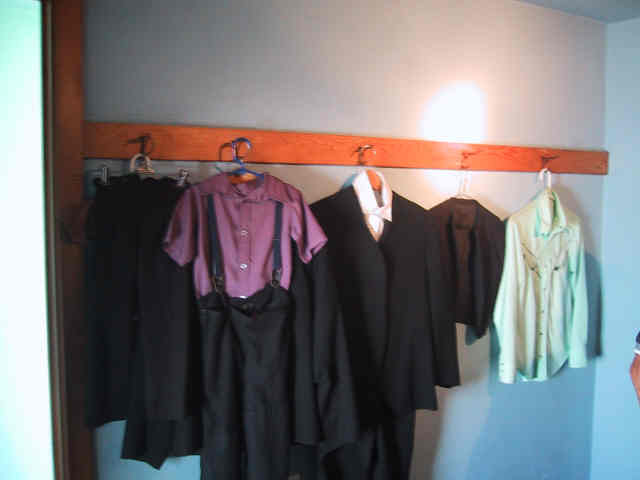
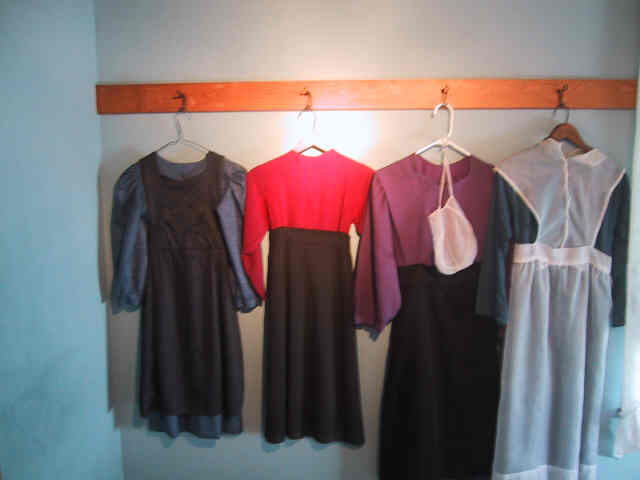
Boy's and men's headwear: black hats with brims less than 4 inches for all
months except for summer. Straw is used in summer. Brims 4 inches or
over are reserved for the bishop.
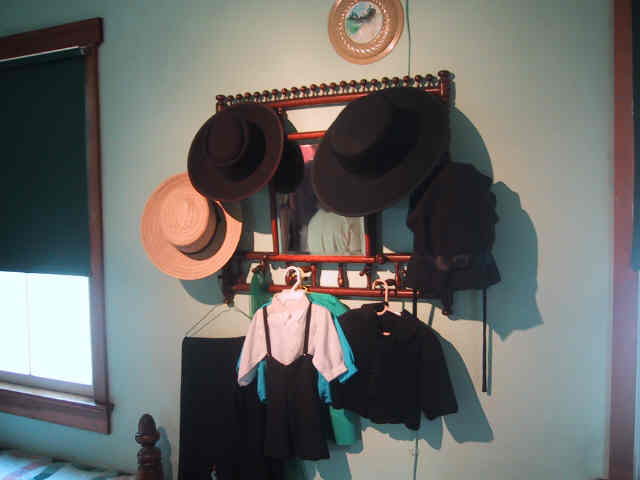
The Amish do not wish to be photographed, although when or if asked they may
agree to be. So we were rather circumspect in taking the few pictures we
have, from a distance only, and never of faces.
This sight was everywhere, preceded by the rapid rhythmic clop-clop clop-clop
of the horses hooves. The practical single day range for such a rig was
commonly thought to be 25 miles. For longer trips, Amish will either take
the train, or hire an 'English' to take them. This has spawned a small
industry of retirees in the area who hire themselves out to be periodic drivers
for the Amish.
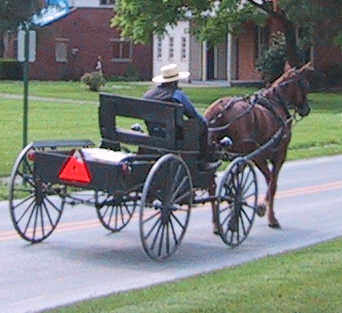
This country is hypnotically beautiful and peaceful, even though virtually
all of it is under cultivation. And, apparently, the Amish don't use
pesticides and have continued to farm as their ancestors did. It feels very safe and tranquil. It
is as if the Amish's presence here for 300 or so years has ebbed into the very
soil, infusing it with their values and spirit. It is very odd, but all of
us felt this, and, whatever it is, I think it contributes to why people return
here to be tourists in Amish country.

We would often take drives, ambling through the countryside, and would come
across scenes like the one below. The image is somewhat hard to discern: a
woman is sitting on top of a horse-drawn plow, working her way down the rows.
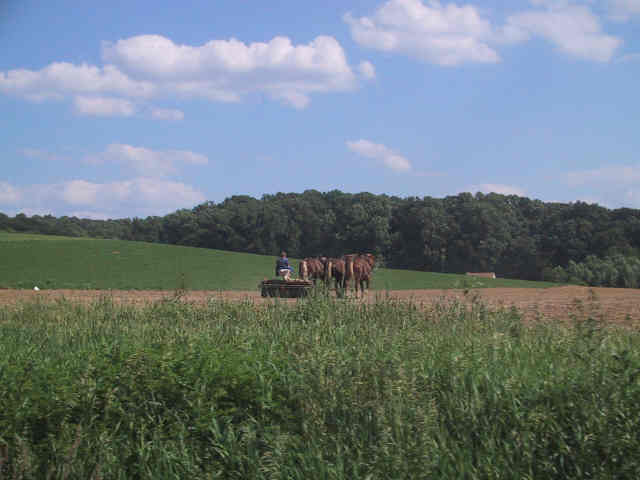
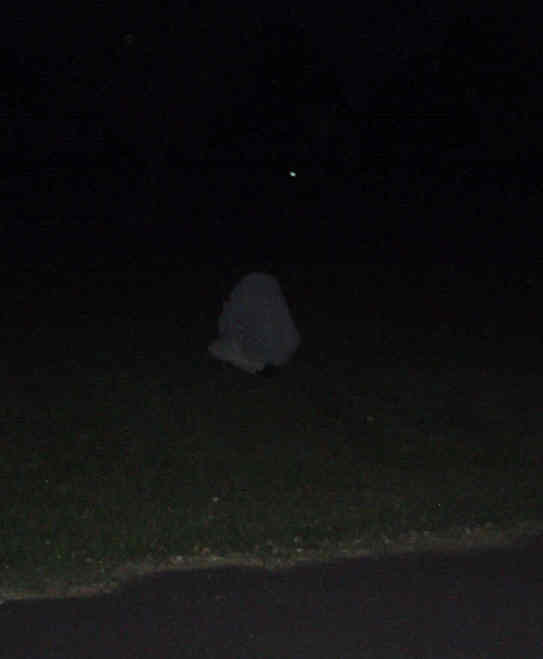 This odd picture was taken by Jordan. That is me, in the middle of a small
field, watching fireflies. The neat thing about this shot is that she
captured a firefly while it was lit; that is the small bright spec you see above
my head. It was really magical. We just hung out in this
field, watched fireflies, and listened to an Amish 'Hymn Sing' at a nearby
farmhouse. Prior to my joining them, Jody and Jordan had sat in a wooden
swing doing the same.
This odd picture was taken by Jordan. That is me, in the middle of a small
field, watching fireflies. The neat thing about this shot is that she
captured a firefly while it was lit; that is the small bright spec you see above
my head. It was really magical. We just hung out in this
field, watched fireflies, and listened to an Amish 'Hymn Sing' at a nearby
farmhouse. Prior to my joining them, Jody and Jordan had sat in a wooden
swing doing the same.
I managed to catch one of the fireflies in my hand. They look a little
like elongated lady bugs. He would not light while I held him, so I let
him go.
While we were in Williamsburg, we met a delightful family that we ran across
several times during our week there: the Etzweilers. During one visit with
them they asked us where we were bound, and when we replied that we would be up
in Amish country in a week or two, they offered to have us to dinner at their
home, as they lived in Lancaster. So, we took them up on their generous
offer, and met them on a Saturday. They offered to be our tour guides for
Lancaster (city), so off we went to the first pretzel factory in the USA -- the
Sturgis Pretzel factory in Lititz. For $2 each, we got a quick spiel
covering the history of this bakery, including a lesson in how to twist a
pretzel prior to baking. Of course, eating fresh-baked soft pretzels was
part of the experience (although we had to pay extra -- 3 pretzels for a
dollar).
Below from left to right: Dale, Ellen, Tara, Natalie, Jordan, Joya and
me. Missing from this picture were Jody, who shot the photo, and the
Etzweiler's oldest daughter, Abby, who was working during much of our visit.
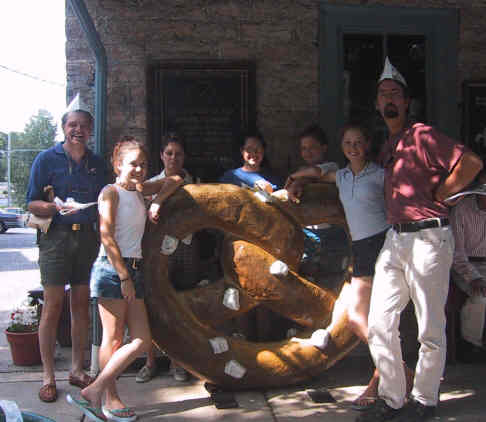
After pretzels, we saw the Lancaster railway station -- a lovely old stone
building in the tradition of European rail stations -- and some of the
historic buildings of this fine town. The home pictured below was
renovated from a dilapidated state to its current over-the-top glory.
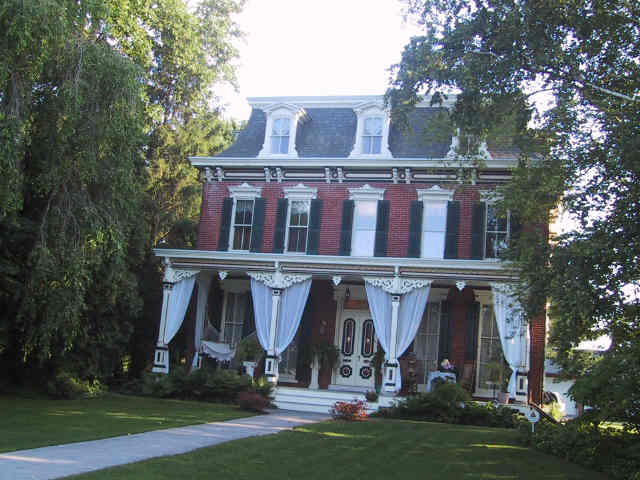
That evening just before sunset, the young ladies all frolicked in the
cornfield behind the Etzweiler home. A family of fox were known to stalk
about this field, but we did not see them during our visits.
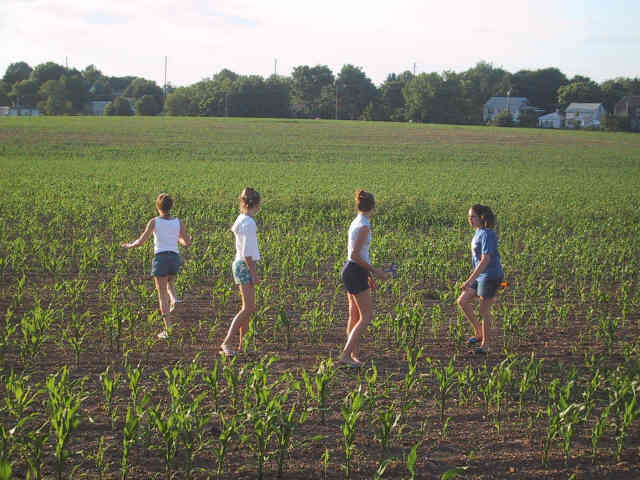
Jody and I picked them up the next day, Sunday, and took this one last shot
of the Etzweilers. It was really a treat to get to spend time with
them. Our families were remarkably compatible.
After we left, we talked about how generous they were with us and with their
time -- we occupied their entire weekend, and they were remarkably gracious
hosts, feeding us almost continuously. We were invited to dinner,
initially, and didn't mention our dietary handicap. The Etzweilers had
planned to have ribs on the BBQ. When we sprung it on them that we
couldn't join them in the meatfest, they graciously changed the menu. On
our way home from touring the city, we stopped at the grocery store where we
aquired a good number of things the Etzweilers had never tasted before.
They were so willing to try new things! We brought home mangoes, avocados,
and cilantro. We ate out on their deck, at sunset, and spent a lovely
evening getting to know each other.
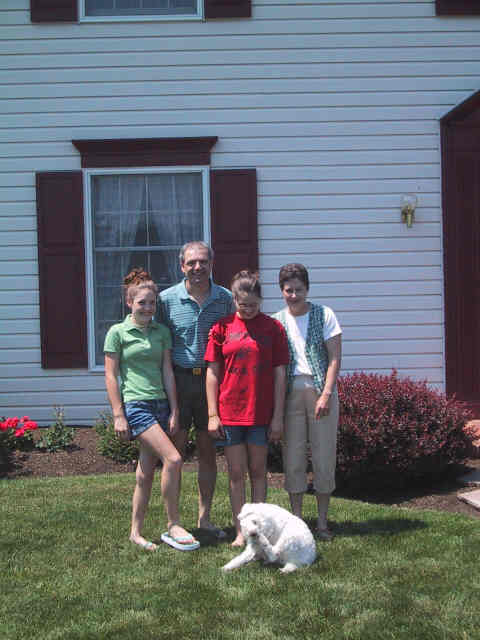
The next day, Monday, as we were leaving Intercourse, we took back roads,
hunting for small Amish children selling strawberries from a wagon by the
roadside. We had found such before. This time, we found the wagon
and berries, but no children were in evidence -- they were for sale for $1 per
quart, on the honor system. Put the money in the can, and take your
berries. We wanted 2 quarts, but were having trouble finding exact change;
we were looking in seat cushions, in the bottom of purses, etc., and only came
up with one dollar and some change. We were parked in front of their home
for so long that the couple who owned the place came out. When Jody
approached them and explained that we did not have exact change, they insisted
that we simply take the 2 quarts -- for free. They had been picked that
morning, and needed to be eaten soon or they would spoil. When Jody
protested, the wife said "my husband has said: no money". And
for her, that clearly closed the issue entirely. We thanked them
profusely, and talked about our time here as we nibbled strawberries on the
drive West.
June 12 - Gettysburg
![]()